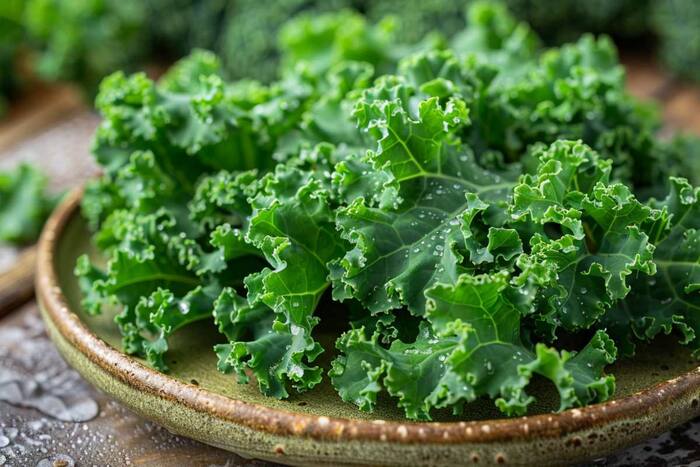
By clicking “Accept All Cookies”, you agree to the storing of cookies on your device to enhance site navigation, analyze site usage, and assist in our marketing efforts Cookies Policy.

Kale is often touted as one of the most nutrient-dense vegetables you can eat, and for good reason. Here’s an in-depth look at the numerous health benefits of kale:
Vitamins and Minerals: Kale is an excellent source of essential vitamins and minerals. It’s particularly high in vitamins A, C, and K. Vitamin A supports eye health and immune function, vitamin C is crucial for collagen production and skin health, and vitamin K plays a key role in blood clotting and bone health.
Minerals: Kale also provides significant amounts of minerals such as calcium, potassium, and magnesium. Calcium is important for bone health, potassium helps regulate blood pressure, and magnesium supports muscle and nerve function.
Free Radical Neutralization: Kale is packed with antioxidants like quercetin and kaempferol. These compounds help neutralize free radicals in the body, reducing oxidative stress and potentially lowering the risk of chronic diseases.
Anti-Inflammatory: The antioxidants in kale also have anti-inflammatory properties, which can help reduce inflammation and lower the risk of conditions such as heart disease and arthritis.
High Fiber Content: Kale is rich in dietary fiber, which promotes healthy digestion by aiding in regular bowel movements and preventing constipation. Fiber also supports gut health by fostering a balanced microbiome.
Detoxification: The fiber and antioxidants in kale support the body’s natural detoxification processes, helping to flush out toxins and promote overall well-being.
Cholesterol Reduction: Kale contains compounds like bile acid sequestrants that may help lower LDL (bad) cholesterol levels. This can contribute to a reduced risk of heart disease.
Anti-Inflammatory Benefits: As mentioned earlier, the anti-inflammatory properties of kale’s antioxidants help reduce inflammation, which is beneficial for heart health.
Rich in Omega-3s: Kale contains alpha-linolenic acid (ALA), a type of omega-3 fatty acid that supports cardiovascular health and can help reduce inflammation.
Vitamin K: Kale is one of the best sources of vitamin K, which is crucial for bone health. Vitamin K helps in the synthesis of osteocalcin, a protein involved in bone mineralization.
Calcium: The calcium in kale supports bone strength and density, making it a valuable addition to a bone-healthy diet, especially for those who do not consume dairy.
Low in Calories: Kale is very low in calories but high in fiber and water content, making it a filling food that can help with weight management. The fiber helps you feel full longer, reducing overall calorie intake.
Nutrient Density: Its high nutrient density means that even though kale is low in calories, it provides essential nutrients, making it a smart choice for those looking to lose or maintain weight while still getting necessary vitamins and minerals.
Lutein and Zeaxanthin: Kale is rich in lutein and zeaxanthin, two antioxidants that are beneficial for eye health. These compounds help protect against age-related macular degeneration (AMD) and cataracts by filtering harmful light and reducing oxidative stress in the eyes.
Glucosinolates: Kale contains glucosinolates, compounds that have been shown to have potential anti-cancer properties. These compounds may help detoxify carcinogens and inhibit cancer cell growth.
Research Support: While more research is needed, some studies suggest that consuming cruciferous vegetables like kale may be linked to a lower risk of certain types of cancer, including breast, lung, and colon cancers.
Hydration and Vitality: The high water content in kale helps keep the skin hydrated. Vitamins A and C contribute to skin health by supporting collagen production and cell regeneration, which can help maintain youthful, healthy skin.
Antioxidant Protection: The antioxidants in kale help protect the skin from damage caused by free radicals and environmental factors, potentially reducing signs of aging and maintaining skin vitality.
Versatility: Kale is incredibly versatile and can be used in a variety of dishes. It can be enjoyed raw in salads, sautéed, added to soups and stews, or blended into smoothies.
Culinary Uses: Its hearty texture makes it ideal for cooking and it holds up well in dishes where other leafy greens might wilt or disintegrate. This versatility ensures that you can enjoy its benefits in many different ways.
For breaking news and live news updates, like us on Facebook or follow us on Twitter and Instagram. Read more on Latest Dishes News on India.com.